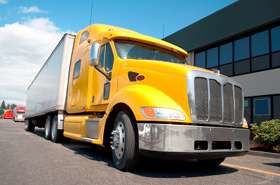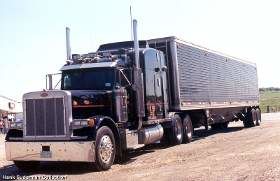Apu Exemption And Steer Axle
Topic 19425 | Page 1
APU exemption is for the Drives only.
By the way, take a look at your steer tires. Along the sidewall it should say what each tire is rated for. If a tire if rated for 6,180lb then
6,180 x 2 = 12,360
You can do 12,360 on your steers. However, some states require a maximum of 12,000 no matter what the tire is rated for. So I recommend just sticking to 12,000 max.
APU:
Auxiliary Power Unit
On tractor trailers, and APU is a small diesel engine that powers a heat and air conditioning unit while charging the truck's main batteries at the same time. This allows the driver to remain comfortable in the cab and have access to electric power without running the main truck engine.
Having an APU helps save money in fuel costs and saves wear and tear on the main engine, though they tend to be expensive to install and maintain. Therefore only a very small percentage of the trucks on the road today come equipped with an APU.


Turtle you can only go to 12000 on your steer because that's the rating for your axel. Or if you had tires that were combine less then 12000 you would have to go with that weight. As Daniel said apu only goes for drives and you still can not exceed the weight of the components.
APU:
Auxiliary Power Unit
On tractor trailers, and APU is a small diesel engine that powers a heat and air conditioning unit while charging the truck's main batteries at the same time. This allows the driver to remain comfortable in the cab and have access to electric power without running the main truck engine.
Having an APU helps save money in fuel costs and saves wear and tear on the main engine, though they tend to be expensive to install and maintain. Therefore only a very small percentage of the trucks on the road today come equipped with an APU.

Not that I'm doubting you Daniel, but I've yet to find anything stating the exemption applies to drives only. I can only find that it applies to gross weight and axle weight. It's rather vague.
My steer tires are rated at 6175, so I'm good for 12350 there. But the essence of my question relates to the steer axle rating.
Since the axle is rated at 12000, my gut tells me I must not go over that rating, regardless of tires or apus.
APU:
Auxiliary Power Unit
On tractor trailers, and APU is a small diesel engine that powers a heat and air conditioning unit while charging the truck's main batteries at the same time. This allows the driver to remain comfortable in the cab and have access to electric power without running the main truck engine.
Having an APU helps save money in fuel costs and saves wear and tear on the main engine, though they tend to be expensive to install and maintain. Therefore only a very small percentage of the trucks on the road today come equipped with an APU.

APUs:
Auxiliary Power Unit
On tractor trailers, and APU is a small diesel engine that powers a heat and air conditioning unit while charging the truck's main batteries at the same time. This allows the driver to remain comfortable in the cab and have access to electric power without running the main truck engine.
Having an APU helps save money in fuel costs and saves wear and tear on the main engine, though they tend to be expensive to install and maintain. Therefore only a very small percentage of the trucks on the road today come equipped with an APU.

Forgot to add, I believe it applies to Drives and total gross weight.
34,400 or 80,400 in states that allow it.
I would just stick with 12000 on steers max
To be clear, I intend to stay at or below 12k, but being that I only learned of the apu thing last night, I was curious.
APU:
Auxiliary Power Unit
On tractor trailers, and APU is a small diesel engine that powers a heat and air conditioning unit while charging the truck's main batteries at the same time. This allows the driver to remain comfortable in the cab and have access to electric power without running the main truck engine.
Having an APU helps save money in fuel costs and saves wear and tear on the main engine, though they tend to be expensive to install and maintain. Therefore only a very small percentage of the trucks on the road today come equipped with an APU.


Actually the APU can be added to the weight. According to Prime you are allowed to be at 12400 with APU. According to our shop supervisor the steer tires are the issue not the tractor. The tractor is actually rated 20000 at the steers. The steer tires are rated at 12000. I've run most my loads at within 12000 to 12400 without issue. Many times through weight stations and inspections no prob.
APU:
Auxiliary Power Unit
On tractor trailers, and APU is a small diesel engine that powers a heat and air conditioning unit while charging the truck's main batteries at the same time. This allows the driver to remain comfortable in the cab and have access to electric power without running the main truck engine.
Having an APU helps save money in fuel costs and saves wear and tear on the main engine, though they tend to be expensive to install and maintain. Therefore only a very small percentage of the trucks on the road today come equipped with an APU.

If you're really concerned about the rating on your front axle, simply look at the data plate in the door and it will tell you what the weight rating is for each axle on the truck. A legit 20k steer axle isn't normally found on most road trucks, it's more common on heavy haul units that have the wider steer tires which also have a higher weight rating. The 12k that's taught is honestly just the number that you're left with once your drive and trailer weights are met to make up that 80k threshold. If your tires are rated for more weight then you can go to that weight but you'll rarely find your steers that heavy unless you have a poorly loaded trailer.
Want to make it even more confusing? Start researching individual state rules and how much they allow per inch of tread width.
Truth be told, don't get too worried if you go a little heavy on your steers unless you're over gross.
I'm with Prime also. I asked my dispatcher about it yesterday. He said we're allowed 12350 since the steer tire ratings are limited to that. I then asked why that same logic doesn't apply to the axle rating. He just "well that's how it's been in the 4 years I've been doing this."
I need more than that before I risk a citation over a few hundred pounds. I would love to see something in writing.
Dispatcher:
Dispatcher, Fleet Manager, Driver Manager
The primary person a driver communicates with at his/her company. A dispatcher can play many roles, depending on the company's structure. Dispatchers may assign freight, file requests for home time, relay messages between the driver and management, inform customer service of any delays, change appointment times, and report information to the load planners.I mentioned in the beginning that the door plate clearly says 12000 GWR on the front axle. That's why I'm perplexed over this
New Reply:
New! Check out our help videos for a better understanding of our forum features

















Preview:
This topic has the following tags:
Prime Inc Advice For New Truck Drivers DOT Truck Equipment







 TT On Facebook
TT On Facebook
Ok so I just learned of the apu weight exemption, and I think I mostly understand it. But I can't find an answer for this question:
My front axle is rated at 12000 lbs GWR (stamped on the plate inside drivers door). I still have to adhere to this rating, regardless of my apu exemption, correct?
APU:
Auxiliary Power Unit
On tractor trailers, and APU is a small diesel engine that powers a heat and air conditioning unit while charging the truck's main batteries at the same time. This allows the driver to remain comfortable in the cab and have access to electric power without running the main truck engine.
Having an APU helps save money in fuel costs and saves wear and tear on the main engine, though they tend to be expensive to install and maintain. Therefore only a very small percentage of the trucks on the road today come equipped with an APU.